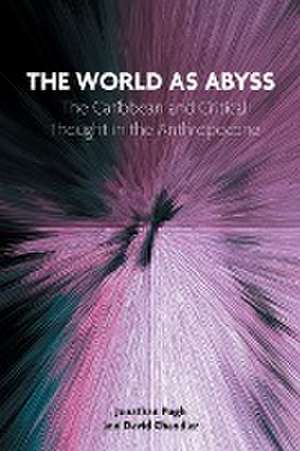The World as Abyss: The Caribbean and Critical Thought in the Anthropocene
Autor Jonathan Pugh, David Chandleren Limba Engleză Paperback – 5 mai 2023
“A much-needed intellectual effort in the non-reductionist and non-essentialising style of Pugh and Chandler's previous book. The World as Abyss gives Caribbean thought and culture the place they deserve within critical theory and materialist studies.” — Mónica Fernández Jiménez, Valladolid University, Spain
“For some time now scholars have questioned the overly general assumptions about the ‘anthropos’ of the Anthropocene, but much work needs to be done to flesh out what a decolonized Anthropocene might be. Pugh and Chandler’s The World as Abyss provides an original, intriguing and compelling counterpoint to bland Anthropocene humanism (and posthumanism). This timely work explores the poetics of the Caribbean and provides a way to think about the Anthropocene and the future beyond the managerialism of the present. This book is essential reading for those working in the environmental humanities or Anthropocene studies.” — Claire Colebrook, Professor, Penn State University, USA
“This book names an apocalypse that began long ago. Pugh and Chandler patiently follow the journey of thought as it travels from the Middle Passage to the Caribbean. This brings them face-to-face with the horror of anti-Black violence, not as just another resource to strip-mine, but as an unavoidable abyss that confines all thought. Its reminder: that we have still not yet begun to think a truly Black world.” — Andrew Culp, Professor, California Institute of the Arts, USA
This book is about a distinctive ‘abyssal’ approach to the crisis of modernity. In this framing, influenced by contemporary critical Black studies, another understanding of the world of modernity is foregrounded – a world violently forged through the projects of Indigenous dispossession, chattel slavery and colonial world-making. Modern and colonial world-making violently forged the ‘human’ by dividing those with ontological security from those without, and by carving out the ‘world’ in a fixed grid of space and time, delineating a linear temporality of ‘progress’ and ‘development’. The distinctiveness of abyssal thought is that it inverts the stakes of critique and brings indeterminacy into the heart of ontological assumptions of a world of entities, essences, and universal determination. This is an approach that does not focus upon tropes of rescue and salvation but upon the generative power of negation. In doing so, it highlights how Caribbean experiences and writings have been drawn upon to provide an important and distinct perspective for critical thought.
Preț: 101.73 lei
Nou
Puncte Express: 153
Preț estimativ în valută:
19.47€ • 20.08$ • 16.24£
19.47€ • 20.08$ • 16.24£
Carte tipărită la comandă
Livrare economică 26 martie-09 aprilie
Preluare comenzi: 021 569.72.76
Specificații
ISBN-13: 9781915445308
ISBN-10: 1915445302
Pagini: 122
Dimensiuni: 152 x 229 x 7 mm
Greutate: 0.17 kg
Editura: Michigan Publishing Services
Colecția University of Westminster Press
ISBN-10: 1915445302
Pagini: 122
Dimensiuni: 152 x 229 x 7 mm
Greutate: 0.17 kg
Editura: Michigan Publishing Services
Colecția University of Westminster Press
Notă biografică
Jonathan Pugh is Reader in Island Studies, Newcastle University, UK. He has more than 90 publications and is particularly noted for his engagements with the 'relational' and 'archipelagic' turns which have disrupted notions of the insular island. He is co-author (with David Chandler) of Anthropocene Islands: Entangled Worlds (University of Westminster Press). Jonathan leads the 'Anthropocene Islands' initiative (see https://www.anthropoceneislands.online/). ORCiD: https://orcid.org/0000-0001-5308-6379
David Chandler is Professor of International Relations at the University of Westminster, London, UK. He edits the journal Anthropocenes: Human, Inhuman, Posthuman. His previous books include Anthropocene Islands: Entangled Worlds (Westminster University Press, 2021); Becoming Indigenous: Governing Imaginaries in the Anthropocene (Rowman & Littlefield, 2019); and Ontopolitics in the Anthropocene: An Introduction to Mapping, Sensing and Hacking (Routledge, 2018). ORCiD: https://orcid.org/0000-0002-2766-7169
David Chandler is Professor of International Relations at the University of Westminster, London, UK. He edits the journal Anthropocenes: Human, Inhuman, Posthuman. His previous books include Anthropocene Islands: Entangled Worlds (Westminster University Press, 2021); Becoming Indigenous: Governing Imaginaries in the Anthropocene (Rowman & Littlefield, 2019); and Ontopolitics in the Anthropocene: An Introduction to Mapping, Sensing and Hacking (Routledge, 2018). ORCiD: https://orcid.org/0000-0002-2766-7169
